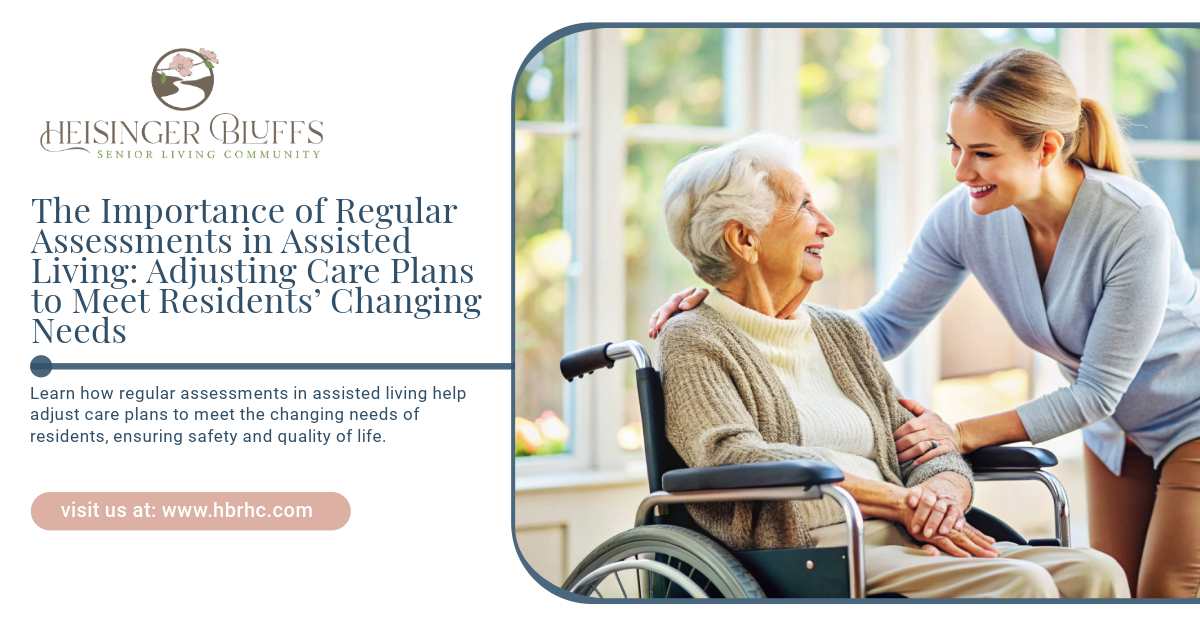The Importance of Regular Assessments in Assisted Living: Adjusting Care Plans to Meet Residents’ Changing Needs

As people age, their physical, emotional, and cognitive needs often change. Assisted living communities are designed to provide seniors with the care and support they need while allowing them to maintain their independence. However, the needs of residents in these communities can evolve over time, requiring adjustments to their care plans. This is where the importance of regular health assessments comes into play.
In this blog, we will explore why regular assessments are crucial in assisted living settings, how they help adjust care plans, and how they ensure that residents receive the appropriate level of support as their needs change. These assessments play a key role in enhancing the quality of life, safety, and overall well-being of seniors in assisted living facilities.
What Are Health Assessments in Assisted Living?
A health assessment in an assisted living community is a comprehensive evaluation of a resident’s physical, emotional, and cognitive health. It involves a multidisciplinary team of healthcare professionals who review the resident’s medical history, current health status, daily functioning, and any recent changes in behavior or abilities. The goal of these assessments is to create or modify a personalized care plan that meets the resident’s specific needs.
Regular assessments typically focus on several key areas, including:
- Physical Health: Mobility, strength, chronic conditions, medication management, and overall health status.
- Cognitive Functioning: Memory, decision-making abilities, and potential signs of dementia or cognitive decline.
- Emotional and Mental Health: Mood, stress levels, depression, anxiety, and general emotional well-being.
- Daily Activities: The ability to perform activities of daily living (ADLs) such as bathing, dressing, eating, and using the bathroom.
- Social and Emotional Support: Social interactions, emotional connections, and engagement in community activities.
Regular assessments are not just a one-time evaluation when a resident first moves into the community. They are ongoing, allowing the care team to respond to any changes in the resident’s health or circumstances over time.
Why Are Regular Assessments Important?
1. Identifying Changes in Health and Abilities
One of the primary reasons regular assessments are so important is that they help identify changes in a resident’s health, abilities, or behavior. Many seniors experience gradual changes that might not be immediately noticeable to family members or caregivers. Regular assessments conducted by trained professionals can detect early signs of health deterioration, mobility issues, cognitive decline, or changes in emotional well-being.
For example, a resident may have been fully independent when they first moved into an assisted living community, but over time, they may develop arthritis, making it difficult for them to bathe or dress without assistance. Regular health assessments can identify this change and prompt the care team to adjust the resident’s care plan accordingly.
2. Personalized Care Plans
No two residents in an assisted living community have the same needs. Personalized care plans are essential to ensure that each resident receives the right level of support for their unique situation. A personalized care plan outlines the type and frequency of care a resident requires based on their health assessment.
Regular assessments help ensure that care plans are always up to date and reflect the resident’s current needs. For instance, if a resident who initially needed minimal assistance with medication management starts experiencing memory issues, their care plan can be adjusted to include more frequent check-ins from caregivers or a shift to more comprehensive medication management services.
3. Improving Safety and Preventing Accidents
As seniors age, their risk of accidents, such as falls, increases. Health assessments play a crucial role in improving safety by identifying any physical limitations or mobility issues that could put a resident at risk. For example, if a resident is starting to experience balance problems or muscle weakness, the assessment team might recommend using a walker or other mobility aids to reduce the risk of falls.
Moreover, regular assessments help ensure that the physical environment of the resident’s living space is safe and appropriate for their abilities. Caregivers may adjust the layout of a room, remove tripping hazards, or install grab bars in the bathroom based on the results of the assessment.
4. Enhancing Quality of Life
One of the key goals of assisted living is to enhance residents’ quality of life, and regular assessments play a critical role in achieving this goal. By closely monitoring residents' physical, emotional, and cognitive well-being, the care team can make adjustments that improve their overall comfort and happiness.
For example, a resident who has become more isolated or withdrawn may benefit from additional social engagement or mental health support. Regular assessments can help identify emotional changes, leading to interventions that promote social interaction, participation in community activities, and mental stimulation.
5. Preventing Hospitalizations
Seniors in assisted living communities are at a higher risk for health complications that could lead to hospitalizations, especially if changes in their health go unnoticed. Regular assessments can help prevent hospital visits by identifying potential health issues early on and addressing them before they escalate.
For instance, if a resident’s assessment shows a decline in their respiratory function, early intervention, such as respiratory therapy or a change in medication, can be initiated before the issue worsens. Early detection and treatment of health problems help reduce the need for emergency medical care, leading to better health outcomes and a higher quality of life for residents.
6. Supporting Cognitive Health
Cognitive health is a major concern for seniors, especially when it comes to conditions like Alzheimer’s disease and dementia. Regular assessments can track cognitive function over time, helping the care team identify early signs of cognitive decline.
By closely monitoring memory, decision-making abilities, and cognitive functioning, assessments enable caregivers to implement early interventions that may slow cognitive decline or help residents adapt to changes in their cognitive abilities. Adjustments to care plans might include increased supervision, memory-enhancing activities, or specialized therapies designed to support cognitive health.
7. Facilitating Communication with Families
Families play a crucial role in the care of their loved ones, and regular assessments help keep them informed about the resident’s health and well-being. These assessments provide valuable information that families can use to understand their loved one’s needs and the type of care they are receiving.
Moreover, regular assessments allow for ongoing conversations between the care team and family members. If any concerns arise, families can collaborate with caregivers to adjust care plans and ensure that the resident is receiving the best possible support.
How Are Regular Assessments Conducted?
Health assessments in assisted living communities are conducted by a team of professionals who specialize in different areas of care. This team often includes nurses, doctors, physical therapists, occupational therapists, social workers, and caregivers.
The assessment process may involve:
- Initial Evaluations: When a resident first moves into the community, an initial assessment is conducted to determine their current health status, abilities, and care needs. This assessment forms the foundation of the resident’s personalized care plan.
- Ongoing Monitoring: After the initial assessment, residents undergo periodic evaluations, which may be scheduled at regular intervals (e.g., every six months) or triggered by specific health events, such as a fall or hospitalization.
- Family and Resident Input: Residents and their families are encouraged to provide input during assessments. This helps ensure that the care plan reflects the resident’s preferences, goals, and personal needs.
- Comprehensive Review: Assessments are comprehensive, covering all aspects of a resident’s health and well-being. This holistic approach allows the care team to adjust the care plan in a way that promotes overall wellness, rather than addressing health issues in isolation.
Signs That an Assessment Is Needed
While regular assessments are typically scheduled on a routine basis, there are times when an unscheduled assessment may be necessary. Some signs that an assessment may be needed include:
- A noticeable decline in the resident’s physical health or mobility.
- Changes in behavior, such as increased confusion, anxiety, or withdrawal.
- Difficulty performing daily tasks that the resident previously managed independently.
- Increased forgetfulness, disorientation, or memory issues.
- A fall, accident, or recent hospitalization.
If any of these signs are observed, it is important to request an assessment to evaluate the resident’s current needs and adjust the care plan accordingly.
Conclusion
Regular health assessments in assisted living communities are essential for ensuring that residents receive the right level of care as their needs change. These assessments allow for personalized care plans that improve safety, enhance quality of life, prevent hospitalizations, and support cognitive and emotional health.
At Heisinger Bluffs, we understand the importance of regular assessments in maintaining the well-being of our residents. Our dedicated team of healthcare professionals works closely with residents and their families to create and adjust care plans that provide the best possible support for each individual’s unique needs. By conducting regular evaluations, we ensure that every resident receives the care and attention they deserve.











